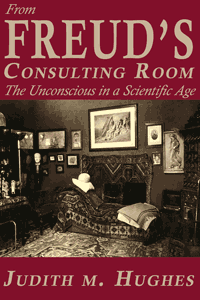
From Freud's Consulting Room
Publisher: Harvard University Press
Please provide your name and email to get free downloads.
Downloaded 2122 times since
The science of mind has been plagued by intractable philosophical puzzles, chief among them the distortions of memory and the relation between mind and body. Sigmund Freud’s clinical practice forced him to grapple with these problems, and out of that struggle psychoanalysis emerged. From Freud’s Consulting Room charts the development of his ideas through his clinical work, the successes and failures of his most dramatic and significant case histories, and the creation of a discipline recognizably distinct from its neighbors.
In Freud’s encounters with hysterical patients, the mind-body problem could not be set aside. Through the cases of Anna O., Emmy von N., Elisabeth von R., Dora, and Little Hans, he rethought that problem, as Hughes demonstrates, in terms of psychosexuality. When he tried to sort out the value of memories with Dora and Little Hans as well as with the Rat Man and the Wolf Man, Freud reintroduced psychosexuality and elaborated the Oedipus complex. Hughes also traces the evolution of Freud’s conception of the analytic situation and of the centrality of transference, again through the clinical material, including the case of Freud himself, who at one point figured as his own “chief patient.”
Moving from case to case, Hughes has coaxed them into telling a coherent story. Her book has the texture of intellectual history and the compelling quality of a fascinating tale. It leads us to see the origins and development of psychoanalysis in a new way. (235 pp.)
Reviews
“A distinguished piece of scholarship offering a novel, lively, and always accessible account of Freud’s intellectual development from the 1890s to the formulation of the ‘structural’ model of the self–id, ego, and superego. A tour de force–original, incisive, and a pleasure to read”
–Paul Robinson, Stanford University
“The particular approach taken in this book…yields original and fruitful results. The argument that by grappling with these issues in the practical context of his work with his patients Freud was gradually forced into the position of establishing psychoanalysis in its own autonomous space, independent of physiology, philosophy, or history is an interesting and provocative position to put forward…The book makes an original and important contribution to the study of Freud’s work that advances our understanding of how psychoanalysis emerged as an autonomous discipline.”
–William J. McGrath, University of Rochester
About the Author
Judith M. Hughes, Ph.D. is both a historian and a practicing analyst. You can learn more about Dr. Hughes and her other publications by visiting her faculty page. http://history.ucsd.edu/people/faculty/hughes.html
Everyone who makes a donation of even a few dollars to this site has our permission to put “Official IPI Donor” on their CV.

